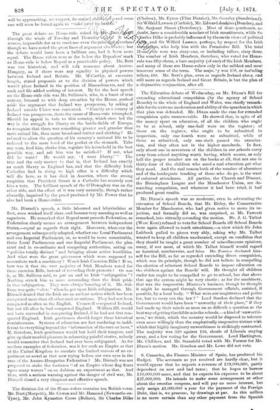The Education debate of Wednesday, on Mr. Dixon's Bill for
extending educational compulsion (by the agency of School Boards) to the whole of England and Wales, was chiefly remark- able forthe extreme moderation and ability of the speeches in which that plan was defended. Mr. Dixon made the case for extended compulsion qttite unanswerable. He showed that, in spite of all the money spent on education, of all the children who ought to be at school, only one-half were on the register ; of those on the register, who ought to be submitted to inspection, only one fourth were so submitted, while of those so submitted, only one-sixth passed the examina- tion, and they often not in the higher standards. In fact, only about one in seventeen of the children in our schools carry away from school anything worth having, which means, as only half the proper number are on the books at all, that not one in thirty-four of the children who need a real education get what they need. And the real reason both of the number of absentees and of the inadequate teaching of those who do go, is the want of enforced attendance. All parties, the Church and Dissent, the Birmingham League and the Manchester Union, are de- manding compulsion, and wherever it had been tried, it had produced great results.


































 Previous page
Previous page